The History Of Suzuki Aerio Sedan
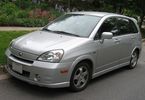
The Suzuki Aerio (called the Liana in Europe, South Asia and Australia) is a compact car that was built by Suzuki Motor Corporation. It was introduced in 2001 as a replacement for the Suzuki Esteem/ Baleno, with a tall 5-door hatchback (for maximum inner room efficiency) and a 4-door sedan body. It featured two different 16-valve gasoline straight-4 engines, with 1.5L and 1.8L, this one capable of 125PS (92kW; 123hp) JIS. Models in North America got a bigger and more powerful 2.0L engine with 145 hp. A 5-speed manual transmission was standard with a 4-speed automatic optional. All-wheel-drive was available, but only with the automatic.
American Aerios came in two trim levels: the S and GS (2002-2004), S and LX (2005), and Base and Premium (2006-2007). Key changes over the years included an upgrade to a new 2.3-liter 155horsepower (116kW) engine in 2004, a major styling and interior refresh in 2005 (replacing the strange digital instruments with conventional analog ones), and the standardization of antilock brakes in 2006. Only the Aerio sedan remained for 2007, as the hatchback had been shelved to make room for the new 2007 SX4 hatchback. Likewise, the Aerio sedan bowed out at year's end, making way for the 2008 SX4 Sport sedan. Throughout its run, the Aerio was distinct for being the most affordable car in America to offer all-wheel-drive.
In Europe, where the car is called Liana (an acronym for "Life In A New Age"), it's seen as a more affordable alternative to small family cars or to mini MPVs, introducing a new generation of Suzuki M engines, with 1.3L and 1.6L I4 engine. All wheel drive is available on the bigger engine. In 2004 the car was restyled with a look that closer resembled the Japanese version, and also received a Diesel engine, with a 16-valve version of the 1.4L HDi engine supplied by PSA Peugeot Citroën, capable of 90PS (66kW; 89hp) thanks to common rail direct injection and a variable geometry turbocharger.
The Liana is best known for its appearances in the BBC's Top Gear's Star in a Reasonably-Priced Car segment, as the sedan model was used from its first show until the model's replacement by a Chevrolet Lacetti in the show's spring 2006 season.
In 2001, Suzuki specially built spaceframe racing car for hillclimb races with a bodyshell to resemble the Aerio dubbed the Suzuki Aerio P950 Pikes Peak Special driven by its rally team manager and former rally driver, Nobuhiro Tajima.
Tajima retired from the race, one mile (1.6 km) short of the finishing line suffering from mechanical failures,, team-mate Yutaka Awazuhara took the fourth overall in a Grand Vitara. Tajima would finish as runner up in the All Japan Dirt Trial Championship that year with the same car and won the Race to the Sky hillclimb in 2003 before it was rebuilt as a Grand Vitara, then in 2007 as an XL7, breaking the overall course record at Pikes Peak.
From Wikipedia, the free encyclopedia
More About Suzuki Aerio Sedan
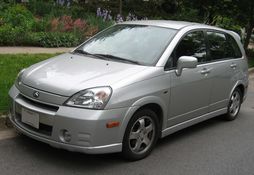
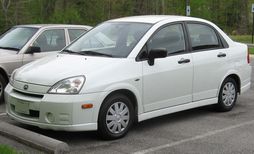
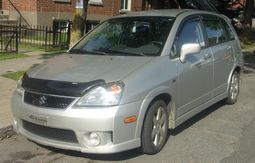
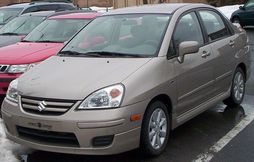
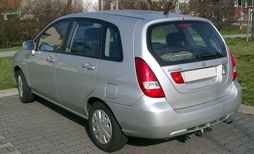
|